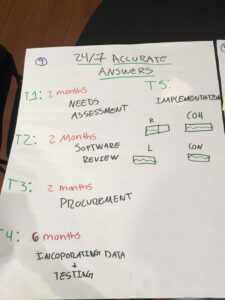
What if we conceptualized student mobility not as a hierarchy or about getting from one level to the next, but rather in terms of maximizing connections students can make? This was the reframing challenge from Dr. Sam Museus, a Professor of Education Studies at UC San Diego, who implored the audience – comprised of higher education faculty and staff from across the country – to begin thinking in new ways and to see new opportunities for college students. The notion of reframing itself was fitting for the audience, given that the prior day, they had engaged in reframing challenges as opportunities for design.
On Tuesday 2/5 and Wednesday 2/6, my colleague Jennifer Stein and I traveled to La Jolla, California for the Higher Ed Innovators and Disruptors: Social Mobility & Student Success Conference, which was organized by the Student Retention and Success team at UC San Diego. The purpose of the conference was to engage higher education practitioners in learning from each other and from leading scholars in order to better understand how to enhance students’ paths toward college success, while also striving to reverse the effects of institutionalized biases that have adversely affected college students.
The keynote speakers for the conference were Dr. Tia Brown McNair, Dr. Nicole M. Stephens, and Dr. Museus. Each of these nationally renowned scholars and authors shared insights on how institutions of higher education can foster more student-oriented and culturally inclusive environments that promote social mobility.
As part of the conference, Jennifer and I led a pre-conference workshop for about 40 participants applying design practices to the opportunities and challenges related to promoting student social mobility. During this workshop, we were happy to see many people energetically embrace design thinking and jump into their designs.
After a short presentation outlining the mindsets and processes used in popular design thinking methodology, we asked participants to jump into an iterative cycle of improving some aspect of how higher ed relates to social mobility. Participants began with a shared storytelling question, with each person writing a short narrative related to their experience with social mobility. Attendees “interviewed” others in the room, sharing their stories and capturing notes, listening for key insights, themes, or pivotal moments or events.
Next, the attendees distilled their themes at table groups, and identified a common set of themes that they bundled into a focused How might we…? question. The value of the HMW question is that it helps designers build a frame for which they can begin to generate ideas and prototypes for their challenge. Teams then began to generate ideas using Spark Questions, which is an activity we’ve adapted from Jeanne Liedtka and Tim Ogilvie’s Designing for Growth: A Design Thinking Tool Kit for Managers. For prototyping, we adapted a resource we love: the odyssey planning tool from Burnett and Evans’ Designing Your Life.
At the end of the session, table teams shared their processes and prototypes. One team explored new ways to create networking opportunities with students lower the potential stress that can accompany formal networking events. Another team created a prototype of student-led collaborations with faculty designed to help create more relational lines of communication between students and instructors. And finally, one team generated an idea for a student support app, and they were very excited to share that this work would be something they could take right back to their collaborators at their campus who will provide funding for the app!
The next day, we led the closing session of the conference by having attendees reflect on and synthesize the insights they gleaned from the speakers throughout the day.
Overall, I came away from the conference inspired to work with such committed educators, and grateful to have learned so much about bringing a social mobility emphasis into future projects. A big thanks to the SRS team and to UCSD for such an incredible event!
